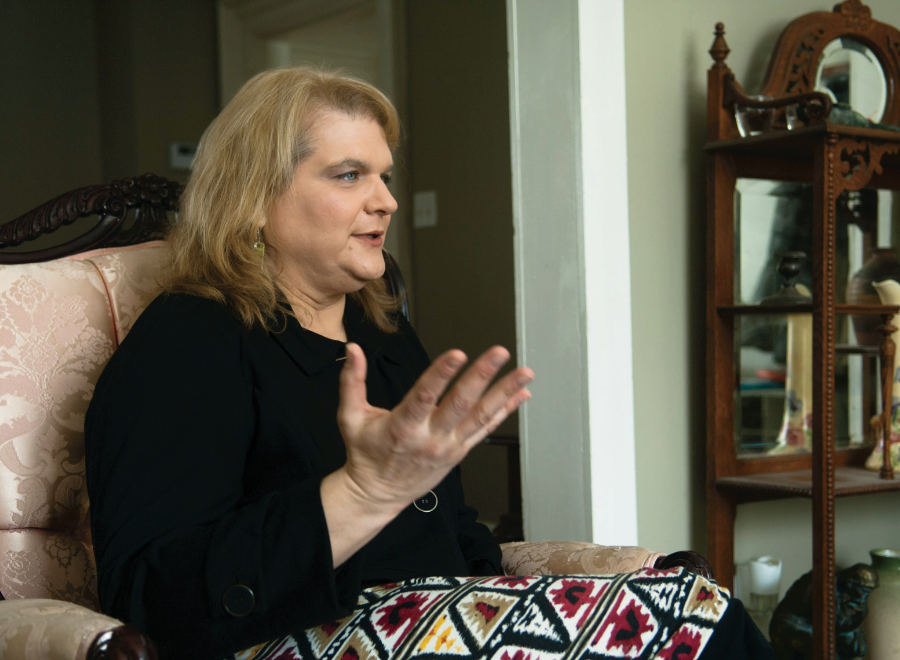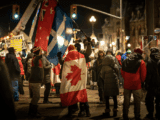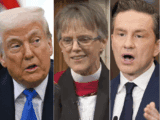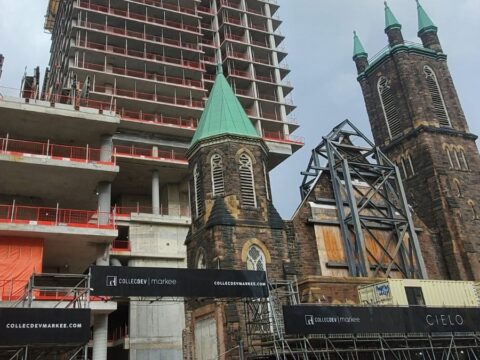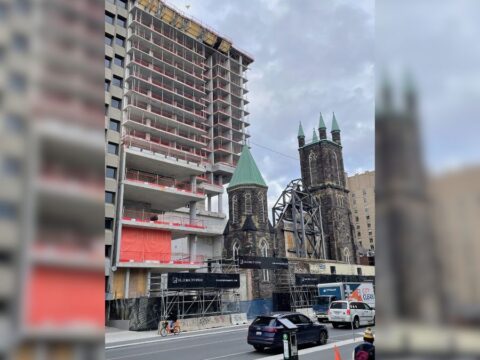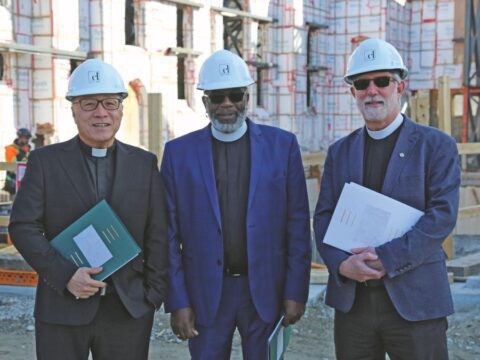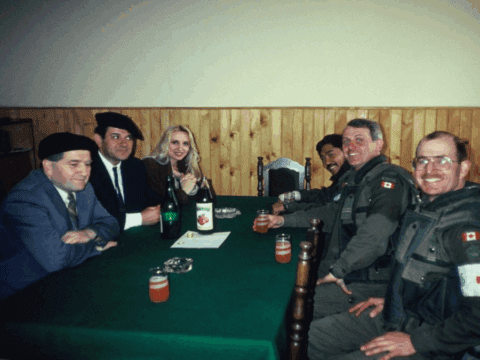Rev. Cindy Bourgeois is the first known transgender person to be ordained in the United Church. She is now the pastoral care and youth minister at Central United in Stratford, Ont. She spoke to Larke Turnbull.
LARKE TURNBULL: The term “transgender” has many interpretations. What do you mean when you use it to describe yourself?
You may unsubscribe from any of our newsletters at any time.
CINDY BOURGEOIS: I acknowledge that gender is a continuum and that all people’s gender are valid. I experienced my gender as around the trans feminine area of the continuum. So I’m comfortable being trans, comfortable being a woman. I usually describe myself as a trans woman or a woman, depending on the context.
LT: How did you family respond when they learned you identify as female?
CB: It took a couple of them a little while to get their minds around it, but my family has been very supportive. My mother said, “I just want you to be happy.”
LT: How did others, such as friends and colleagues, react?
CB: I have lost very few friends. I owned a business and I lost my business over it. My business partner forced me out because the business was teaching children, anad he thought parents wouldn’t be able to handle that I’m trans. The ironic thing is that I got settled to a children’s ministry in Stratford.
LT: What kinds of challenges have you faced because of your gender identity?
CB: I have been harassed. It happens on a regular basis still. People feel free to shout things out to me on the street or sometimes threaten me on the street. I suppose a major place I’ve been harassed is by the psychiatric community….For many years, when I came out to my psychiatrists, they always insisted that I stay in the closet and that I could handle this and have a “normal” life — whatever that means.
I suppose also my settlement process….They were very concerned about finding a safe place for me – I think perhaps too concerned – and I ended up getting a place where it’s not full time. It’s three-quarter time, and you know I really need the money. Trans people are traditionally unemployed, and so the United Church participated in that on their first trans minister.
LT: What stumbling blocks, if any, did you encounter during your studies to become a minister?
CB: Really [my advisers] just gave me some support. None of them had really gone through it. Rev. Joan Wyatt [director of contextual education at Toronto’s Emmanuel College] supported me a ton. My classmates were fantastic. I was just accepted.
LT: Where you raised in the United Church?
CB: I was raised Anglican until I was about 10, and we stopped going to church. I think we just drifted away. But actually, the reason I went back to church was because when I was coming out, I found a church that was a safe place for trans people, Emmanuel Howard Park United [in Toronto]. Rev. Cheri DiNovo was there, and she’s been a really amazing person for me, and the congregation was good, too. So I went there, and I just took to it. The line I always use is that I came for the community and stayed for the Christ. I like church life. I remember one time sitting in church and thinking, okay, I’m a Christian now, what does that mean? And to me, what it meant was that I should learn the Bible and also that I should volunteer at our outreach. We had a free dinner at our church every Sunday, and we opened the place up for coffee. And so I started hanging out there, and that was really formative for me.
LT: What led to your call to become a minister?
CB: Well, I got forced out of my business, and I was looking for another job. I had taught kids for 12 years, and I was thinking about becoming a high school teacher. And then a friend of mine, Christine Small from Emmanuel Howard Park, who was in her first year at Emmanuel College, said, “Why don’t you consider becoming a minister? You have a great faith, you obviously can have a ministry just being trans.” And I prayed about it and thought about it, and it really felt right. I thought it was an opportunity really to make a difference in people’s lives.
LT: This summer, a settlement committee placed you at Central United, where you are one of two ministers. It’s your first job as minister. What were your feelings as you prepared for this?
CB: I was concerned about it. I was worried. [The congregation] did education before I got there, when I wasn’t present — I actually requested this — so they could ask questions about what being trans means without insulting their new minister. That was really helpful, I think.
[A friend] also advised me to get someone who is high up in the United Church to preach to the congregation that this is a good thing. So I got Joan Wyatt, who is well known in the United Church and well known in this area. She was a real mentor to me at school as well. She totally knocked it out of the park when she preached that my getting settled there was a glimpse of all that was right in the Kingdom and in the world.LT: What responses have you received from Central United so far?
CB: The response has been excellent. I must say there are a few families who have left the church. It wasn’t just because I came there, but that was the final straw. But otherwise, it’s been fantastic. I know some of the kids really like me; I’ve had good feedback from their parents. Some of them have said, “Oh, we’re so happy that you’re here, and you’re doing such a great job.”
That’s one of the beautiful things about being a minister. Children and youth are usually better than adults with trans people. They might ask questions that adults would consider inappropriate, but once I explain it to them, they say, “Okay, I see.”
When I go to visit people, it’s been a real honour to hear their amazing stories from their amazing lives. Rev. Cheryl Ann [Stadelbauer-Sampa, Central’s full-time minister] has been fantastic. They have a sign outside that says all are welcome at Central, and that’s been my experience.
LT: How does your gender identity inform your role as a minister?
CB: I think I understand what it is to be outcast, which to me is so much of what Jesus’ ministry was, ministry on the margins. I know what it is to not be allowed in places because of who I am. So that’s something that helps me really understand Jesus’ ministry on a very deep level. As a trans person, you occupy this space where you don’t quite fit in here or there, and that really is kind of a sacred space. I think it gives me a deep connection to the Spirit.
LT: Since coming out, what kinds of changes have you seen in attitudes toward trans people?
CB: Prior to [my] coming out, the trans people were erased. We weren’t allowed in the world. In my adolescence, the idea of living as a woman was something I wanted deeply, but I just thought there was no way that could ever happen. In the past 20 years, we’ve seen more and more trans people and gender-queer people in the media, in the world. For the most part, the way the world treats trans people is getting better. I don’t want to say that it’s good, but there are some possibilities for trans people now, whereas 30 to 40 years ago there just weren’t.
***
This story first appeared in The United Church Observer’s March 2011 issue with the title “‘Trans people occupy this space where you don’t quite fit in, and that is a sacred space.’”

